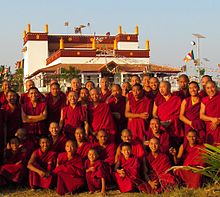Sangha Talks

Sangha (IPA: [sɐnɡʱɐ]) is a Sanskrit word used in many Indian languages, including Pali which means "association", "assembly", "company" or "community"; In these languages, sangha is frequently used as a surname. In a political context, it was historically used to denote a governing assembly in a republic or a kingdom, and for a long time, it has been used by religious associations, including Buddhists, Jains and Sikhs. Given this history, some Buddhists have stated that the tradition of the sangha represents humanity's oldest surviving democratic institution.
In Buddhism, sangha refers to the monastic communities of bhikkhu (monks) and bhikkhuni (nuns). These communities are traditionally referred to as the bhikkhu-sangha or the bhikkhuni-sangha. As a separate category, those Buddhists who have attained any of the four stages of enlightenment, whether or not they are members of the monastic community, are referred to as the āryasaṅgha ("noble Sangha").
According to the Theravada school and Nichiren Shoshu Buddhism, the term sangha does not refer to the community of sāvakas (lay followers) nor does it refer to the community of Buddhists as a whole.
| Title | Speaker | |
|---|---|---|
Five Masters in the Kamakura Period Lotus Sutra, Faith, Chanting, Evil, Vows, Precepts, Ceremony, Demons, Sangha, Lineage... |
Mar 03 1978 Tassajara |
|
The Self Ego, realization, Transmission, Echo, Sangha, Nirvana, Delusion, Zazen, Doubt,... |
May 17 1980 City Center |
|
Application of the Practice - Feminism and Buddhism in the Diamond Sangha Emptiness, Lineage, Aspects of Practice, Bodhisattva Vow, Heart Sutra, Sangha,... |
Aug 14 1981 2 |
|
Application of the Practice - Feminism and Buddhism in the Diamond Sangha Emptiness, Aspects of Practice, Lineage, Separation, Sangha, Monastic Practice, Lay,... |
Aug 14 1981 1 |